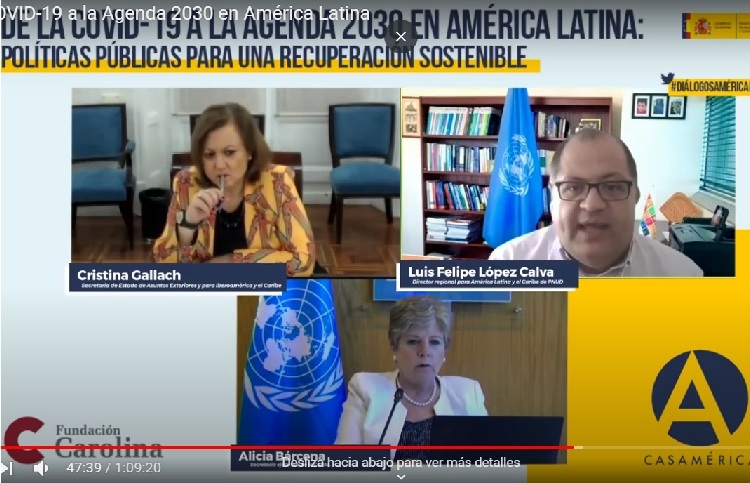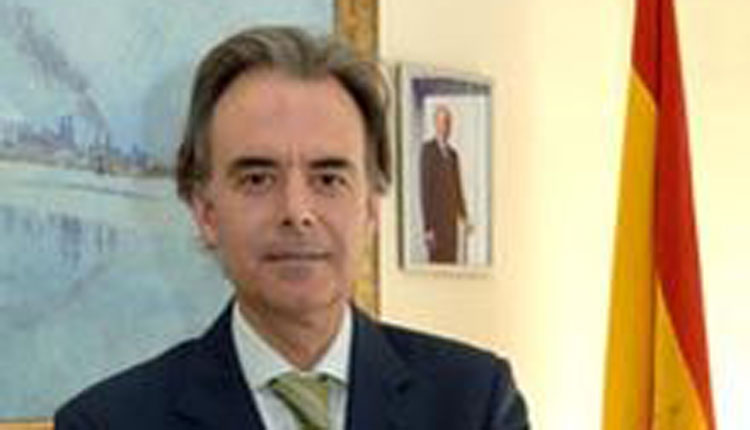Eduardo González
The COVID-19 crisis has aggravated the structural problems and economic and social imbalances in Latin America, a situation that can only begin to be properly corrected with access to vaccines that are only trickling into the region due to their “hoarding” by a few high-income countries.
These are the main conclusions of the twelfth colloquium of the Dialogues with Latin America, organised yesterday by Casa de América and the Carolina Foundation under the title From COVID-19 to the 2030 Agenda in Latin America: public policies for sustainable recovery.
During the event, the Secretary of State for Foreign Affairs and for Ibero-America and the Caribbean. Cristina Gallach, reiterated “Spain’s explicit commitment” to the socio-economic recovery of Latin America within the framework of the Sustainable Development Goals (SDGs), but warned that “the positive dynamic of transformation” that the 2030 Agenda had generated has begun to suffer with the COVID-19 crisis. “Both the goals and the indicators are no longer credible at the present time because we have regressed, especially in Latin America”, and therefore “a more credible 2030 Agenda is needed in the nine years that remain” until its conclusion, “because we run the risk of discrediting” one of “the most positive instruments” of the international community, she warned.
For her part, the Executive Secretary of ECLAC, Alicia Bárcena, warned that the COVID crisis “has magnified the structural problems of Latin America and the Caribbean”, where poverty is expected to reach 209 million people and where extreme poverty stands at 78 million. For this reason, she said, it is necessary to tackle two important gaps: the one affecting women who have had to leave the labour market as a result of COVID-19, for which she proposed extending the basic emergency income; and the digital gap, which keeps 40 million households without internet, for which she proposed a basic digital basket that would represent 1% of GDP.
The ECLAC director also warned of the need to “review the role of multilateral and regional banks” in order to favour access to financing because “the World Bank supports low-income countries, but not middle-income countries”. “We can eliminate extreme poverty by 2030, but for that we need a fiscal pact and political will”, she said.
Bárcena also denounced inequality in access to COVID-19 vaccines. “There has been a hoarding of vaccines by a few countries, which have bought even larger quantities than they need”, and therefore “the world needs broader solidarity, not only with the COVAX mechanism but also in other ways”, she warned.
For his part, the regional director for Latin America and the Caribbean of the United Nations Development Programme (UNDP), Luis Felipe López Calva, warned that, according to a World Bank study, the region will suffer an economic loss of 1.2 trillion dollars, a figure that corresponds to “the total economy of Mexico“. He therefore proposed a series of measures to overcome the crisis, such as “rethinking social protection systems”, the use of digitalisation as an element of inclusion, the search for “green engines of growth” and a commitment to “effective governance”.
In any case, he warned, “equitable access to vaccines is a fundamental precondition for the reopening of many aspects of recovery in Latin America”, but at the moment “there are 80 countries with vaccination programmes already underway and 62 of them are high-income countries”. “In Latin America, only 14 countries have active vaccine programmes”, which reveals a “profoundly inequitable access to vaccines that requires coordinated multilateral action”. In this regard, Alicia Bárcena pointed out that in Latin America “there are 14 countries with active vaccine programmes… but without vaccines, that is the problem”.







